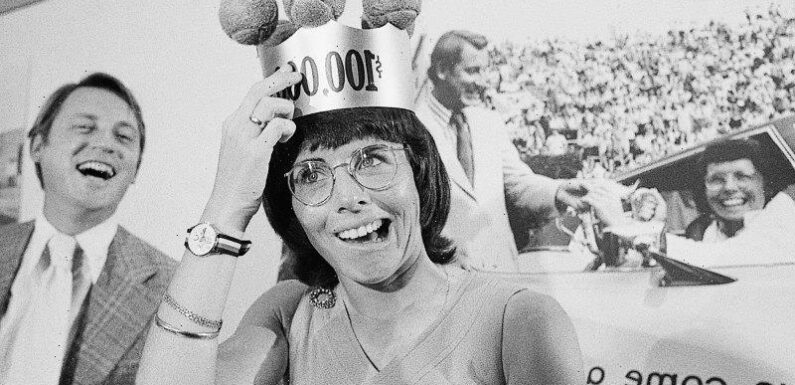
Has Nobel Prize-winning economist Daniel Kahneman ever been busted peeing in his own garden? Or had his kid walk in on him while he was having sex?
Some of my friends and I would do just about anything to rid ourselves of life’s constant humiliations. Can you imagine the soul-bursting relief of never having to throw another desperate glance over your shoulder to see who’s caught you in the act? But Kahneman and his team of scientists have announced there’s another solution to a happier life. According to a new study they’ve authored, money can buy happiness.
American tennis player Billie Jean King, pictured in New York City in 1971, when she was crowned for becoming the first female tennis player to earn more than USD$100,000 in a year.Credit:Getty
They found that people’s wellbeing – how much happiness, enjoyment, smiling or sadness and worry they feel during moments of their life, and how they evaluate their life as a whole – increases as their household income does. Not only that, but that their happiness doesn’t plateau once it reaches USD$75,000, as a previous landmark study found, but it continues as household incomes reach beyond $150,000 per year, even as far as $760,000. So says the study, published last week in the Proceedings of the National Academy of Sciences journal.
The caveat was that these findings were only true as long as the person enjoys a certain baseline level of happiness to begin with. (The unhappiest 20 per cent of the 33,391 employed American adults surveyed didn’t report much of an increase in wellbeing beyond $150,000.)
Now, I know I’m lucky. The chance of my every being born – of feeling the rush of belting out Quiet Riot songs in the car during my morning commute – is one in 400 trillion. My kids are healthy. My husband and I are employed. We can afford to feed and house our family. Without this ability, more money would surely be the thing that would bring me the greatest joy.
But beyond that, there are things I desperately want more. That I would give back any number of frivolous purchases I’ve made to get.
Take peeing in my own garden. I was warned by my obstetrician after the birth of my first child 16 years ago that I needed to do pelvic floor exercises or else I’d suffer down the track. Did I listen?
I did not. The exercises made me feel squeamish. So, I didn’t do them. Instead, I spent the last 16 years in denial. I would be the exception, surely. This was a later problem I didn’t need to worry about just yet.
Flash forward 16 years to me, pulling my jeans down in my garden to relieve myself on a tiny, unsuspecting patch of overgrown grass.
This was bad enough. But then my eight-year-old rambled down the path and saw me crouched, with my pants down around my ankles.
“Mu-um?” he said, as he shot me a quizzical look.
“I, I, I… –” I said, before being cut short by the sight of my husband, ambling up behind my kid.
You’ve never seen a person yank their pants up so quickly, and stammer something about checking on the plants before running into the house.
Ridding myself of the humiliations that come with bodily failings and my own laziness would boost my happiness way more than extra cash.
Jettisoning denial would be priceless, too. My refusal to accept that I couldn’t change family members to be who I wanted them to be cost me about 30 years of anguish. To calculate the amount of forehead-clutching boredom I thrust on my husband and friends, while whingeing to them about said family members, would require a new metric. (A therapist finally set me on the path of sanity, and accepting what I could control, and what I couldn’t.)
Other things that would skyrocket my happiness upwards that a wad of cash couldn’t even begin to fix? Never thinking, for even one more second, about how well I fit into my jeans (or don’t). Never having to see another loved one get ill, suffer, or die. To this list, one of my friends says she’d like to make the moment her daughter opened the door to her bedroom and caught her and her husband having sex disappear.
Or, as one of my favourite writers, Anne Lamott once said: “If you have a problem you can solve by throwing money at it, you don’t have a very interesting problem.”
Make the most of your health, relationships, fitness and nutrition with our Live Well newsletter. Get it in your inbox every Monday.
Most Viewed in Lifestyle
From our partners
Source: Read Full Article
